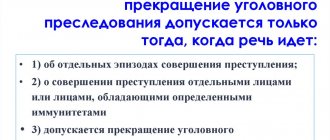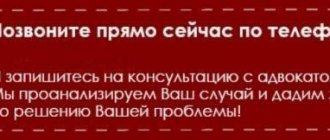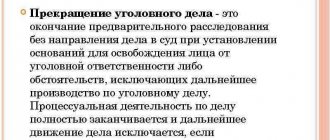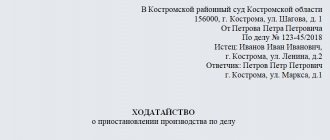Grounds for termination of criminal proceedings and criminal prosecution.
Termination of a criminal case and (or) criminal prosecution is possible only if there are grounds exhaustively listed in the law. These grounds are divided into three groups: rehabilitating, non-rehabilitating and indicating the absence of procedural conditions for continuing the preliminary investigation or inquiry.
Exonerating grounds include: the absence of a crime (clause 1, part 1, article 24 of the Code of Criminal Procedure); absence of corpus delicti in the act (clause 1, part 1, article 24 of the Code of Criminal Procedure); non-involvement of the suspect or accused in the commission of a crime (clause 1, part 1, article 27 of the Code of Criminal Procedure).
Non-rehabilitative grounds include:
1) expiration of the statute of limitations for criminal prosecution (clause 3, part 1, article 24 of the Code of Criminal Procedure), which are specified in part 1 of art. 78 of the Criminal Code of the Russian Federation. At the same time, in order to terminate criminal prosecution on this basis, the provisions of Part 2 of Art. 27 of the Code of Criminal Procedure of the Russian Federation, according to which termination of criminal prosecution due to the expiration of the statute of limitations is not allowed if the suspect or accused objects to this;
2) reconciliation of the parties (Article 25 of the Code of Criminal Procedure). On this basis, the case can be terminated only in relation to a person who has committed a crime of minor or medium gravity for the first time, who has reconciled with the victim and made amends for the harm caused to the victim;
3) the presence of an amnesty act (clause 3, part 1, article 27 of the Code of Criminal Procedure);
4) active repentance of the suspect or accused (Article 28 of the Code of Criminal Procedure), which usually means surrender, assistance in solving a crime, compensation for damage caused or making amends for damage in another way. A case can be dismissed on this basis only in relation to a person against whom criminal prosecution is being carried out in connection with a crime of minor or medium gravity.
Another group of grounds for termination of a criminal case is formed by circumstances indicating the absence of procedural conditions for the continuation of proceedings in the case:
1) death of a suspect or accused (clause 4, part 1, article 24 of the Code of Criminal Procedure);
2) absence of a statement from the victim in cases of private or private-public prosecution (clause 5, part 1, article 24 of the Code of Criminal Procedure);
3) the absence of a court conclusion on the presence of signs of a crime in the activities of the persons specified in clauses 1, 3-5 of Art. 448 of the Code of Criminal Procedure, or the consent of the relevant chamber of the Federal Assembly, the Constitutional Court of the Russian Federation or the qualification board of judges to initiate a criminal case or to be brought as an accused (clause 6, part 1, article 24 of the Code of Criminal Procedure);
4) the presence in relation to the suspect or accused on the same charge of a sentence, resolution or ruling of the court to terminate the criminal case that has entered into legal force or an unreversed decision of the investigator to terminate the criminal case or to refuse to initiate it (clauses 4, 5, part 1 of Art. 27 Code of Criminal Procedure);
5) refusal of the State Duma to give consent to deprive the President of the Russian Federation of immunity (clause 6, part 1, article 27 of the Code of Criminal Procedure).
Criminal prosecution can also be terminated if the person suspected of committing a crime has the right of diplomatic immunity, and the state that this person represents, by virtue of Art. 32 of the Vienna Convention on Diplomatic Relations and Art. 45 of the Vienna Convention on Consular Relations does not waive immunity.
Assistant District Attorney
M.N. Ekaterinenko
Absence of an event that constitutes a criminal act
Sometimes citizens, panicked by accident, contact the police with a demand to initiate a criminal case. The investigator, checking the facts stated in the appeal, notes that he cannot initiate a criminal case, since there was no event that constitutes a criminal act.
What does this mean?
Note!
Such an event is understood as the absence of the necessary facts and life circumstances that serve as the basis for initiating a criminal case.
Example: a citizen writes a report on the morning of March 23 about the theft of a car. The investigator is conducting an investigation. It turns out that on the evening of March 22, the car was towed for illegal parking.
Resuming a suspended investigation
Resumption of a criminal case after suspension is possible at any time. Reasons for this:
- The reasons why production was suspended have disappeared.
- There was a need to carry out some investigative actions.
- The prosecutor or the head of the investigative body canceled the decision to suspend the criminal case, considering it illegal or unfounded.
Participants in the process may take the initiative to resume suspended proceedings. Often the injured party is most interested in this. It is important for her that the unsolved crime is solved, the wanted person is found quickly, and in general there is no red tape in the case.
Despite the fact that this is not directly mentioned in Art. 211 of the Code of Criminal Procedure of the Russian Federation, among the grounds for resuming proceedings, the reason for this may be a complaint by an interested person against a decision to suspend the criminal case. The complaint should be addressed to the prosecutor's office, indicating why you consider the investigator's decision to be illegal or unfounded. You can appeal the investigator's decision to his superior.
If the prosecutor's office cancels the decision to suspend the investigation, it must set out not only the reasons for such a decision, but also instructions on the necessary investigative actions.
From the moment the proceedings are resumed, a 1-month investigation period is established. It can be extended in the general manner.
Why you need to contact a lawyer
By law, the investigator must investigate the case impartially, objectively and professionally. But in practice everything is completely different.
The investigator needs to submit the criminal case to the court. And what “quality” it will be is the tenth question, because without a lawyer the court will side with the investigator.
Also read: What acts are subject to criminal liability from the age of 14
The courts believe the testimony of the police officers themselves unconditionally. The testimony of these employees is called “operational information”, this is the disguise. It is assumed that “operational information” is objective, and a conviction can be based on it.
The court does not want to believe the testimony of defense witnesses. The court believes that they are biased, they are at one with the defendant, etc.
Witnesses? Investigators have “regular” witnesses at the ready who will sign and confirm anything in court. These may be cadets from departmental universities. Of course, they are on the side of the investigator, because they themselves are future investigators.
In cases, for example, about drugs, drug addicts themselves can be witnesses, who thus ensure that the investigator does not touch them for the time being. What kind of termination of a criminal case is there? This is “-1 case” in statistics for the investigator.
Without the help of a lawyer, the investigator will drag the case to trial, even if it becomes obvious that the suspect is innocent. But in court, maybe the case will somehow slip through... Could the judge be indignant and send the case for further investigation? Maybe, of course. If a judge is a conscientious and competent person, such people will meet. But it's better to be safe.
It is important to know: the investigator needs good statistics, so criminal cases are carried out even if they should be terminated. It reaches the point of absurdity. The court believes the investigator more and more willingly than the defendant: one government agency treats another government agency with understanding. And the investigator has more experience in legal matters than the one who got into trouble. What can you do without a professional lawyer whose services you can get? Just go to jail.
Important to know: remember that a lawyer is the only person involved in the case who wants to protect you and knows how to do it. A lawyer knows how to achieve a truly independent examination. How to attract witnesses and force the investigator to take their testimony into account. How to prove your alibi.
Lack of crime
The corpus delicti includes the following elements:
- object - violated right;
- the objective side - signs characterizing the events that resulted in the violated right;
- subject - a citizen who has violated a right;
- the subjective side is the person’s attitude towards the action performed.
Note!
The absence of a crime means that one of the above points “does not apply.”
There may be variations here: the offender has not reached the age of responsibility, there was no malicious intent when committing the crime, public interests were not violated, no rights were violated.
Example: a citizen committed a theft, but he is not held accountable because the subject is incompetent and cannot be aware of his actions.
Death of a suspect
In accordance with the rules of law, cases are terminated on the basis of the death of the suspect without fail. The exception is when further proceedings are necessary to rehabilitate the deceased. In order to issue a decree to terminate a case due to the death of a suspect, the official must obtain a corresponding certificate from the civil registry office. Of course, the case can also be terminated if death is confirmed by a court decision.
Termination of the case against the deceased is possible only in a situation where this is the only basis for making such a decision. If it is not possible to prove that it was the deceased who committed the crime, then the case is terminated on the basis that gives the right to rehabilitation.
If a criminal act was committed by a group of people, then the criminal prosecution procedure against the deceased should be stopped. However, the matter does not stop.
How does the production stop procedure work?
The procedure for suspending a criminal case is regulated by procedural legislation.
Thus, at the stage of preliminary investigation, the investigator makes the appropriate decision. He issues a ruling on this. The document must be sent to the prosecutor. It is after the prosecutor's sanction that the case is considered suspended.
Important! If several persons appear as suspects in a criminal case, then the decision to suspend is made only in relation to those of them in respect of whom it is impossible to carry out investigative actions. Accordingly, the investigator retains the right to separate the case against them into separate proceedings.
The decision to suspend at the trial stage is made by the judge alone.
In cases where the case is suspended due to the fact that the defendant has disappeared, the judge sends the case materials to the prosecutor for the latter to decide on the search. In addition, if the defendant was previously at large, the judge chooses a preventive measure in the form of keeping the escaped person in a pre-trial detention center. This means that immediately after being caught, he will be placed in isolation, where he will await trial.
Some important nuances of the practice of suspending criminal cases
The main problem with suspended criminal cases is the red tape involved:
- If the crime is not solved “hot on the trail,” there is a high probability that the further investigation will proceed superficially, without much effort. Will the operational service solve the crime - well, no - the case will lie like a dead weight until it is suspended.
- With wanted persons, the situation is almost the same: if the first steps did not yield anything, then the investigation will rely only on operatives. In this case, you can only hope that the federal or international search will yield something.
- The illness of the suspect (accused) or his inability to participate in the investigation are special grounds. Sometimes they are used to delay the proceedings, including by the guilty parties, and a suspended criminal case may be “forgotten.”
Basically, red tape is allowed for ordinary crimes - for which there is no particular resonance, which are commonplace and routine. When the investigator's workload is high, he is not interested in dealing with suspended cases or cases that could potentially be suspended. Moreover, the terms of detention are monitored by the prosecutor's office much more strictly than the terms of the investigation. Suspended cases, as a rule, are checked by the prosecutor's office in batches, and are resumed with the cancellation of the suspension order for the sake of their performance indicators. Therefore, the initiative in resuming criminal cases should be taken, first of all, by victims and civil plaintiffs.
Who draws up and approves the document
The document is usually drawn up and signed by completely different people:
- The head of the leading investigative body must confirm what is written.
- The criminal investigation department that conducted the investigation prepares and draws up the paper. Only this person knows perfectly all the little details and important nuances of the proceedings.
You don't have to spend a lot of time drafting the document. There is a single form of paper that differs only in information content.
The manager who approves the document must check it for errors.
If any shortcomings are found, the document is returned to the originator for revision. After modifications are made, the paper is provided to the boss again. If you miss a mistake and send the document to the prosecutor, he can return the paper back without trial. All this will significantly slow down the process associated with the full official completion of the criminal case.
Also read: What to do if a burglary occurs and how to prove it
Reasons for registration
A cease and desist order is issued and granted based on certain circumstances. They are provided for in current legal regulations. In addition to one main reason for terminating a previously registered criminal case, which is the acquittal of the perpetrator, there are several other important reasons:
- Absence of the main fact of violation of the law.
- There is no way to determine the real composition of criminal acts.
- Non-involvement of an individual in a recorded offense.
- Cases in which it is not possible to collect additional circumstances and facts of the crime.
- Complete release under conditions provided for by certain provisions of modern legislation. This rule “works” only when establishing a person’s involvement in a criminal act.
The closure of a criminal case must be accompanied not only by a special resolution, but also by the implementation of certain actions and measures.






